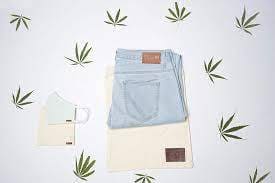Canvasloop fiber is an organization dedicated to popularising sustainability in the textile and fashion industries by developing alternative fiber made from hemp as well as other agricultural residues. Fabrics are one of the most hazardous products on the earth since both cotton and synthetic materials (polyester, nylon, etc.) have a significant impact on the environment. For example, whenever we clean a synthetic fabric, 1900 microplastics are released into the water. CanvaLoop, a Gujarat-based natural material sciences company, established by Shreyans Kokra, helps clothing manufacturers become more responsible by offering plug-and-play agro-waste fiber and yarns. Their technology transforms the textile industry by generating fibers that are socially responsible, economically feasible, and easily accessible.
Started by Shreyans Kokra, a 4th fabric, and fashion businessman, the company was able to construct the back-end of the hemp supply chain in India and now serves a worldwide B2B client base that is constantly seeking to improve the clothing industry's co2 emissions and water consumption. CanvaLoop now supplies hemp fiber (HempLoop), agro-waste mixed yarns (Hemp, Banana, and Pine-apple), and Himalayan Hemp types of denim (Slow by Canvaloop) created from natural growing Hemp in the Himalayan regions of Uttarakhand and Himachal Pradesh to a variety of B2B and B2C customers. " Our objective is to create; textile fibers utilizing agro-waste' the standard clothing material by 2030," Shreyans Kokra founder Canvaloop said. We are creating a vertically integrated, sustainable fashion firm powered by our unique
technology, with the goal of being in every closet by 2030." Theia Ventures and Social Alpha have recently invested 200K dollars in CanvaLoop fiber. In regard to the investment, Priya Shah (General Partner at Theia Ventures) said, " We are delighted to back Shreyans and the CanvaLoop team on their mission to mainstream sustainability in alternative materials and fibers – an important theme in the circular economy – and we are confident in their ability to introduce positive impact on climate change in the textile industry".
CanvaLoop Fibre Characteristics:
Water-Saver: In comparison to cotton, which needs 9000 liters of water per kg, their fiber requires 10 liters per kg.
Nature-friendly: In the manufacture of the fiber, there are no pesticides or insecticides used.
Biodegradability Natural plant fibers were used to make this product.
Pollution-free: Pollution is avoided because agri-waste is diverted to high-value uses rather
than being burned.
Types of Fibres:
Hemploop
HempLoop is made from non-GMO cannabis that has been cultivated organically all over the globe, along with the Himalayas.
Characteristics:
Anti-UV – It shields your skin from the sun's damaging rays.
Anti-Microbial – Helps in the prevention of skin infections. Prevents odor-causing microorganisms from growing on your clothes.
Breathable – It has high air permeability. It also keeps odor and sweat at bay.
It Improves – Wearable, comfortable, and fashionable. With each wash, it becomes softer.
Natural Fibre with the Highest Strength – Tightens and strengthens the material.
Hemp becomes an abrasion-resistant material as a result of this process.
NettleLoop
NettleLoop is made from Himalayan Stinging Nettle that grows naturally in the Himalayan mountains.
Characteristics:
In the winters, it swarms, and in the summers, it’s cold – The hollow nature of the fiber allows it to adjust to every season.
Anti-Microbial – Defends against skin infections.
Stops odor-causing germs from forming on clothing.
It improves over time – Wearable and trendy. With each wash, it softens up. Nettleloop is only offered to a few brands that are willing to commit to a long-term relationship.
Bancorp
Derived from the root of the banana plant, that otherwise would have
been thrown, and turned into textile-grade fibers and yarns utilizing 100
percent environmentally friendly technology.
Characteristics:
Anti-UV – Shields your body from the sun's damaging radiation.
Anti-Fungal – Sole fiber that organically resists the growth of fungi in fabrics.
Breathable – It has a high air penetration. It also keeps odor and sweat at bay.
Pineloop (To be launched in January 2022)
Derived from pineapple leaves that would otherwise be thrown away, it is turned into textile-grade fibers and yarns with 100% green technology.
Characteristics:
Plant Silk – Silky-smooth and lustrous Anti-bacterial – Skin problems are kept at bay with the use of this product. Stops odor-causing microorganisms from growing on your clothes. Breathable – It has a high level of air penetration. It also prevents odor and sweat.
Types of Yarns:
HempLoop/Cotton Blend
HempLoop/Modal Blend
HempLoop/Bamboo Blend
Banloop /cotton blend
Banloop /tencel (excel/lyocell) blend
Pineloop /cotton blend
Pineloop /tencel (excel/lyocell) blend
Slow Jeans, a pair of sustainable jeans advertised as the " world-first Himalayan hemp jeans," has begun a Kickstarter campaign for the company's first consumer good.
The start-up promotes the jeans' sustainability and ethical impact in addition to their comfort and elegance. Slow Jeans claims that utilizing rain-fed Himalayan hemp preserves 3,500 liters of water for each pair of jeans. A factory that employs recycled water and organic indigo colors has also been paired with the firm. The jeans are also said to be 4 times more resilient than the ordinary pair of jeans, and they have inherent anti-microbial characteristics that stop the bacterial growth that causes odor. Slow Jeans debuts at a point when customers value sustainability and antimicrobial clothing. The company provides three different styles (regular, slim, and skinny) in three different colors (black, sky, and indigo) worth $89.

